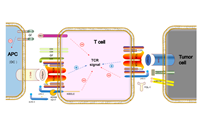Progress of lymphocyte activation gene 3 and programmed cell death protein 1 antibodies for cancer treatment: A review
DOI:
https://doi.org/10.17305/bb.2024.10339Keywords:
Immunotherapy, programmed cell death protein 1 (PD-1), programmed cell death protein 1 ligand 1 (PD-L1), lymphocyte activation gene-3 (LAG-3), combination therapyAbstract
The application of immune checkpoint inhibitors has proven to be an effective treatment for cancer. Immune checkpoints such as programmed cell death protein 1/programmed cell death protein 1 ligand 1 (PD-1/PD-L1), cytotoxic T-lymphocyte-associated protein 4 (CTLA-4), T-cell immunoglobulin-3 (TIM-3), T-cell immunoglobulin and ITIM domain (TIGIT), and lymphocyte activation gene-3 (LAG-3) have received extensive attention, and the efficacy of antibodies or inhibitors against these checkpoints (either alone or in combination) has been evaluated in many tumors. This paper provides a brief overview of the PD-1 and LAG-3 checkpoints, and then shifts focus to the combined use of PD-1 and LAG-3 antibodies in both in vivo and in vitro experiments. In the in vitro experiments, we examined the correlation between the expression and activation of these inhibitors on T cells, and also assessed toxicity in animals in preparation for in vivo experiments. The effects of the combined use of PD-1 and LAG-3 antibodies were then summarized in animal models of melanoma, MC38 carcinoma, and other tumors. In clinical studies, the combined application of these antibodies was assessed in patients with melanoma, colorectal, breast, and renal cell cancers, as well as other solid tumors. In general, the combination of PD-1 and LAG-3 antibodies has shown promising results in both in vivo and in vitro studies.
Citations
Downloads

Downloads
Published
Issue
Section
Categories
License
Copyright (c) 2024 Yu-Quan Li, Xue-Mei Chen, Gui-Fei Si, Xue-Min Yuan

This work is licensed under a Creative Commons Attribution 4.0 International License.









